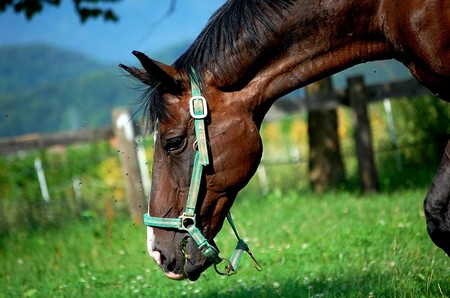The rule “feed little and often” should always be applied to horses. They are designed to be trickle feeders, with small stomachs in relation to body size and need to top up with food regularly. This means a horse has a small amount of food in it at all times and never a lot at once, as it cannot cope with digesting large quantities. This makes it an eating machine, and a horse in the wild will travel miles for food, foraging between 16 and 18 hours a day on a diet consisting mainly of grass with additional vitamins and minerals from other plants as they find them.
For the domesticated horse, the same rules apply. The horse’s stomach is very fragile and overfeeding or feeding of poor-quality, unsuitable foods could easily lead to digestive problems such as colic. Feeding a highly palatable and well-balanced diet is a vital part of horse ownership. Smaller grazing areas and stabling mean that the horse will not have access to the wide variety of vitamins and minerals found in the wild, so a suitable replacement must be supplied. Good-quality hay and grass should be available, with increased quantities provided during colder weather when the horse uses a lot of its energy to keep warm. Additional feed is most important during the winter months, as any horse kept without proper nutrition will be more susceptible to disease and infection.

Feeding horses is a complex practice specially if it is used for horse racing. All horses are different, with varying requirements and workloads, and so need be fed accordingly-the dietary requirements of a riding club horse will not be the same as that of a race or event horse. For many horses, at rest or in light work, a diet of good-quality hay and grass would be perfectly adequate
Extruded feeds and coarse mixes are specially formulated concentrate feeds that provide a standardized, balanced diet. They are available in a range of varieties, from low-energy to competition mixes. to keep them healthy. However, horses with greater workloads or horses that are older should have part of their bulk food ration replaced by concentrates such as coarse mixes or extruded foods. Concentrates have a higher energy value than forage and are specially formulated to maintain and improve body condition.